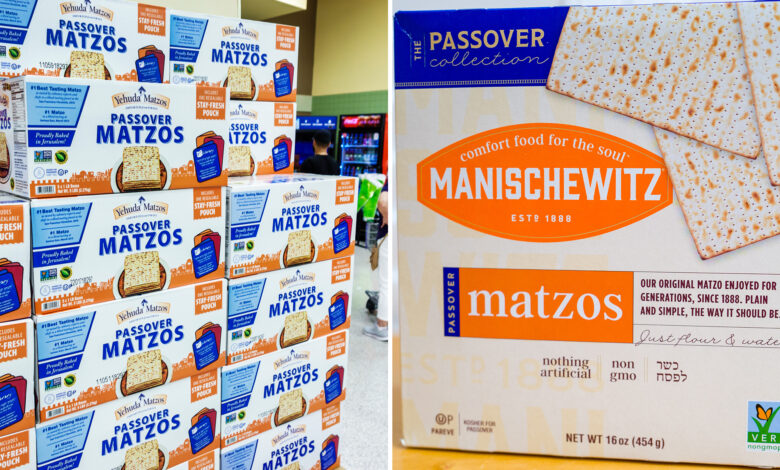‘Shrinkflation’ hits matzo just before Passover

Oy vey!
Shrinkflation is coming for matzo – just in time for Passover, consumer advocate Edgar Dworksy reported.
At least two popular packaged matzo brands, Manischewitz and Yehuda, rolled out four-pound packages of the traditional Kosher food in that cost even more than the five-pound package did just a year ago, Dworsky noted on his blog earlier this month.
The situation is a classic case of “shrinkflation,” or when packages are downsized without a commensurate price cut, Dworsky said.
“Passover matzo has been one of the few products that has escaped shrinkflation until now. On top of that, some stores are raising prices too, so it is a double whammy for shoppers,” Dworsky noted.
Dworsky noticed the smaller packages at his local Stop & Shop just a few weeks ahead of Passover, the seven-day Jewish holiday that starts at sundown on April 22.
The new packs at a Boston-area Stop & Shop were a whopping $5.99 – one dollar more than 2023’s price for the five-pound version, he said.
Handmade matzo — which is only available in specialty shops — is even more expensive these days, costing up to $30 per pound.
“The prices have gone nuts, and we certainly hear a lot about the inflation price of handmade matzo…they’re priced like truffles,” Rabbi Chaim Steinmetz of Congregation Kehilath Jeshurun on the Upper East Side told The Post.
In an emailed statement, Stop & Shop said that the smaller packs were because customers complained they did not use the entire five-pound option.
The price hike was due to the rising prices of Kosher food supplies, the chain said.
“The matzo is probably the most significant symbol of the holiday,” Rabbi Steinmetz said.
“Because the matzah represents that the Jews left Egypt rapidly and they couldn’t. They didn’t have the time to allow their dough to rise and bake it into bread. So they had to bake it into thin wafer-like cakes,” he explained.
Many Passover observers adhere to a strictly Kosher diet during the holiday, and avoid leavened bread products.
“I don’t eat regular cereal during the time of Passover. I will use the little broken up pieces of matzo, pretending that it’s cereal, and pour some milk on it,” Roz Rachlin, 89, said.
The matzo is also a key part of the Seder, or the traditional feast to mark the start of Passover.
“I’ve been celebrating Passover since I was a little girl. I used to sit at the Seder table with a bunch of Passover coconut macaroons in my lap, because the prayer took so long I had to munch on something!” Rachlin, a native Yiddish speaker, recalled.
Matzo is a common topic among Steinmetz’s congregation these days — what kind they like, brands to avoid, and, of course, how much it costs.
“I have no doubt that shrinkflation will be noticed by Kosher consumers, they will certainly notice if there is a change,” he added.
But Rabbi Steinmetz might have less to worry about than others in his congregation.
When asked if he enjoys matzo, Steinmetz laughed and protested “You’re asking a rabbi!” — then admitted “I’m not a huge matzo person.”




